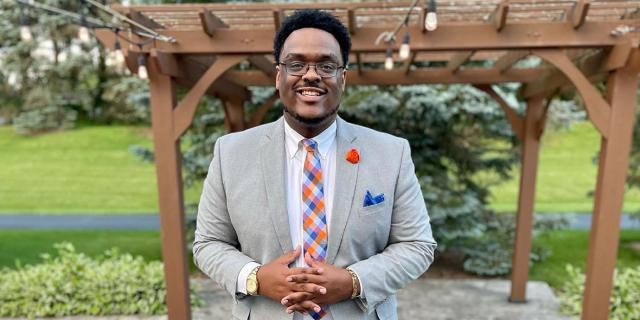
Community Health Workers Raise Awareness About COVID Vaccine
MIDDLETOWN, Ohio (July 30, 2021) - If the job they were hired to do no longer becomes necessary, that’s OK with the newest members of UWGC’s Middletown Area Center team.
Community health workers Joslynn Pretty and Calvin Davis are building relationships with local businesses and agencies. They are meeting residents in the Middletown area to raise awareness and educate people about COVID-19 vaccines.
“I would much rather eradicate this (virus),” Davis said. “I’m OK with working myself out of a job because it means we were successful.”
Pretty agreed, noting that defeating COVID would mean attention could turn to other health issues that affect vulnerable people.
Now, though, their focus is on preventing COVID. Both Davis and Pretty say they know people who have battled the disease, including some who lost that battle. “It was definitely a motivation for me to take on this role, seeing firsthand what the virus can do to people,” Davis said.
United Way partnered with Ohio State University and the Center for Closing the Health Gap to hire Pretty, who began work in May, and Davis, who started in June. Working as a team, their duties include meeting residents at community gatherings such as Middletown’s Broad Street Bash and Community Building Institute’s Back to School event.
When someone approaches her, Pretty’s first question typically is: Have you been vaccinated? If the answer is no, she politely asks why. “A lot of people respond that they don’t trust it; they don’t know what’s in it,” she said. “So, we have materials that explain that.”
Another common concern among residents revolves around how quickly the COVID vaccines were developed. The team explains that enormous resources and technological advances made it possible to rush vaccine development without compromising safety.
Given some people’s skepticism about COVID-19 vaccines, such conversations have the potential to be emotionally charged. But that hasn’t been the case, Pretty and Davis said, because of the approach they take.
“We’re not in a position to force or to demand anyone to get a shot. It’s everyone’s personal choice,” Davis said. “We’re coming from a place of seeking to understand people. We’re not mocking them, not shaming them, just trying to understand their thought process and their concerns.
“When you come from a place of, ‘Hey, we’re just trying to understand you, we’re not trying to force anything on you,’ people are generally more receptive,” he said.
Pretty and Davis certainly do understand Middletown and its people. “I grew up here, and I’ve worked here for many years,” Pretty said. In her work as a community health worker, “I find myself meeting more people I know than strangers.”
Like Pretty, Davis is a Middletown High graduate and has plenty of connections in the area. “That helps with the learning curve because it’s not like someone has to explain to us the culture of Middletown,” he said.
Even before COVID, the Middletown area was beset by issues such as income inequality and the relatively poor health of residents. The pandemic compounded those disparities.
Health outcomes will improve if more people are vaccinated against COVID-19. And so United Way sends Pretty and Davis into the Middletown community. To listen to concerns. And to provide information that may make a difference in whether someone gets a COVID shot.
“I want people to have an educated opinion,” Davis said, “so they can decide with the facts.”